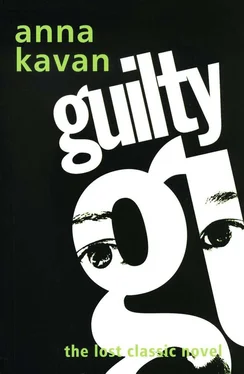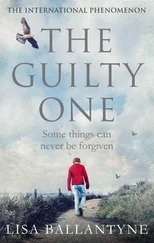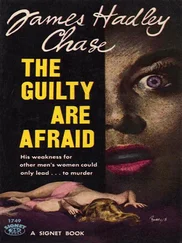I tried in vain to assimilate this, revolving the words in my mind. No, it was no good. I couldn’t take it in. Silently, with the distant vagueness of a patient coming out of an anaesthetic, I watched him switch on a small light in front of us, producing from somewhere a paper parcel, which he proceeded to unwrap, saying as he did so, ‘I’m sorry about this, Mark. I hate to distress you. But no one else can give the identification the authorities need.’
Without in the least understanding what he meant, I felt a far-off tremor of warning, gazing blankly at the oddly shaped object he held out for my inspection. The queer-looking incomplete thing, with its charred irregular edges and tapered projection, seemed faintly reminiscent of something I couldn’t recall. I told him I didn’t know what it was, wishing he’d put it away. As the seconds passed, I was developing an unreasonable aversion towards the nameless fragment, more particularly to its smell; for it gave off a peculiar odour I’d never before encountered — an acrid chemical smell, mixed with the smell of old burnt material and something bitter, heavy, oppressive, which I couldn’t place and which yet seemed familiar. This composite odour was strangely penetrating, clinging and disagreeable, pervading the whole interior of the car; I felt it would hang about me for days if I touched the thing. Nevertheless, I was obliged to overcome my reluctance and take it into my hand, since it was held out inescapably. Still I could make nothing of it. I noticed the charring wasn’t new; it seemed unnatural for the smell to cling so persistently. Vaguely turning it over, I discovered some rubbed gilt lettering, blackened and blurred at one end to illegibility but with the initial F still visible and guessed rather than saw an R and a G, puzzling over some lost association.
Then suddenly it came back. The shoes, neatly paired in their boxes, were strewn around us, prettily cuddled up side by side in their tissue beds. My mother’s foot on the stool looked naked and unprotected in the thin stocking, till the assistant fitted on the soft elegant suede, smoothing it tenderly around the ankle. ‘Ferragamo. I always wanted a pair. But they’re so expensive. Do you think I’m terribly extravagant, Marko?’
The shoe shop faded. I was left with a sinking premonition of similar visions to come, remembered incidents of no importance, trifles, perhaps irritating at the time but, in retrospect, of an unbearable pathos. Still I could think of no appropriate words but, as I had to say something, said stupidly, ‘They were her best shoes’, and, to my own astonishment, burst into tears as if I’d been six years old.
I suppose Mr Spector took the remains of the shoe away from me then, for I remember hiding my face in my hands and being unable to find my handkerchief; he was very patient and kind, pushing his own into my fingers and letting me cry on his shoulder. And I remember how, momentarily, I seemed to recapture the heavenly peace of some remote childish occasion when I’d rested against him in this same way and lost it again at once, like a face seen from a fast-moving car.
I didn’t feel anything much about my parents. I didn’t even know why I was crying and felt ashamed of my tears, but I couldn’t control them — they simply went on and on, for no reason. When they finally stopped, and I sat up, blowing my nose, I couldn’t look at the man beside me, who said kindly, ‘I’m afraid I have to go back now. Is there anything you want to ask me first?’
I felt I ought to ask questions about how my parents had died. But the only thing I wanted to know was whether this fragment of shoe was all they’d found of my mother — as he’d suggested by his words about identification — and this I couldn’t bring myself to ask. I wondered if he’d be shocked by my selfishness when I said, ‘Shall I have to leave now?’ After all, I had to know what was going to happen to me.
The question seemed to surprise him. He told me that I must, of course, stay on and take the final examination, and we would see then what was to be done. ‘And now I really must get back to my work.’ After this broad hint, I said a hurried goodbye and got out of the car quickly, for something in his voice pierced my self-absorption, conveying an impression of the quite extraordinary importance of this work, the exact nature of which had never been revealed to me.
It had become quite dark. There was a moon, but only dim, intermittent gleams penetrated the heavy cloud. When the headlights came on I stepped back quickly out of their searchlight beams, surprised to see one of the soldiers getting into the back seat — had he been watching us all the time? The car swung slowly around and swayed out of the yard, bumping over the hollows, and I followed it but then turned the opposite way, not wanting to meet anyone, not wanting to go indoors. And I remember stumbling about aimlessly for a while, feeling sorry for myself, till I walked into a bush, which scratched my face and hands viciously.
The thorny scratch coming as a sharp reminder, I suddenly realized how I’d taken it for granted that Mr Spector would look after me, though he was under no sort of obligation to do so and obviously overloaded already with heavy responsibilities. It had seemed to me such a matter of course that I hadn’t even thanked him. All my feelings of inferiority revived at this instance of my own graceless behaviour. No wonder people disliked and distrusted me; how could I ever have believed anything different? Even the death of my parents meant nothing to me, I thought, trying to evoke the scene before my imagination but defeated at the start by not knowing how they had looked. True, I knew my mother had been wearing her best shoes, but I couldn’t remember her dresses well enough to know which she would wear to the theatre — most likely she’d bought a new one for the occasion, and this I couldn’t possibly imagine. As for my father, I didn’t get as far as trying to picture him, before the moon escaped abruptly through a ragged hole in the clouds, as though it had gnawed its way out.
In its pallid light, I saw that I’d wandered back unknowingly to the school buildings; I watched them glide, stealthy black masses, into the lighter space where just now only the night had been. For an instant then the horrors of all my childish nightmares were thick about me: tall spectres, petrified in innumerable malign mutations; and one calamitous shape towering above them all, as hideously unnatural as a child’s control of a father’s fate.
If I hadn’t opposed his wish, he and my mother would be alive now. So I’d killed him — killed them both. The thought I’d unconsciously been repressing since I’d heard the news at last thrust itself forward. Now the moon dimmed again, the phantoms blurred and were reabsorbed into darkness, stuff of darkness themselves. I repeated to myself, ‘I’ve killed them both’; and the words ‘So what?’ followed closely enough to deprive the thought of all reality. I would keep it that way, unreal; my instant decision reduced the fact to the region of childish fantasy. Turning my back on the invisible chessmen, I cautiously moved away, my hands outstretched like a blind man’s before my face, my fingers touching now close-clipped leaves, now the unevenness of old brickwork, now the cooler, smooth face of stone.
I was approaching Jaggers’s house, when the picture I’d failed to create formed of its own volition; my mind’s eye saw a city street, traffic and many people, everything shifting, confused, where my parents walked side by side among all the rest, unprotected and unsuspecting. To my callow youth, the pair looked elderly, almost old, and this, for some reason, gave them a curious air of innocence, pathos. And here the vision seems not incorrect; for they indeed belonged to the last of the innocents, of the trusting ones, who trusted their fellows as no man, perhaps, will ever trust others again.
Читать дальше












